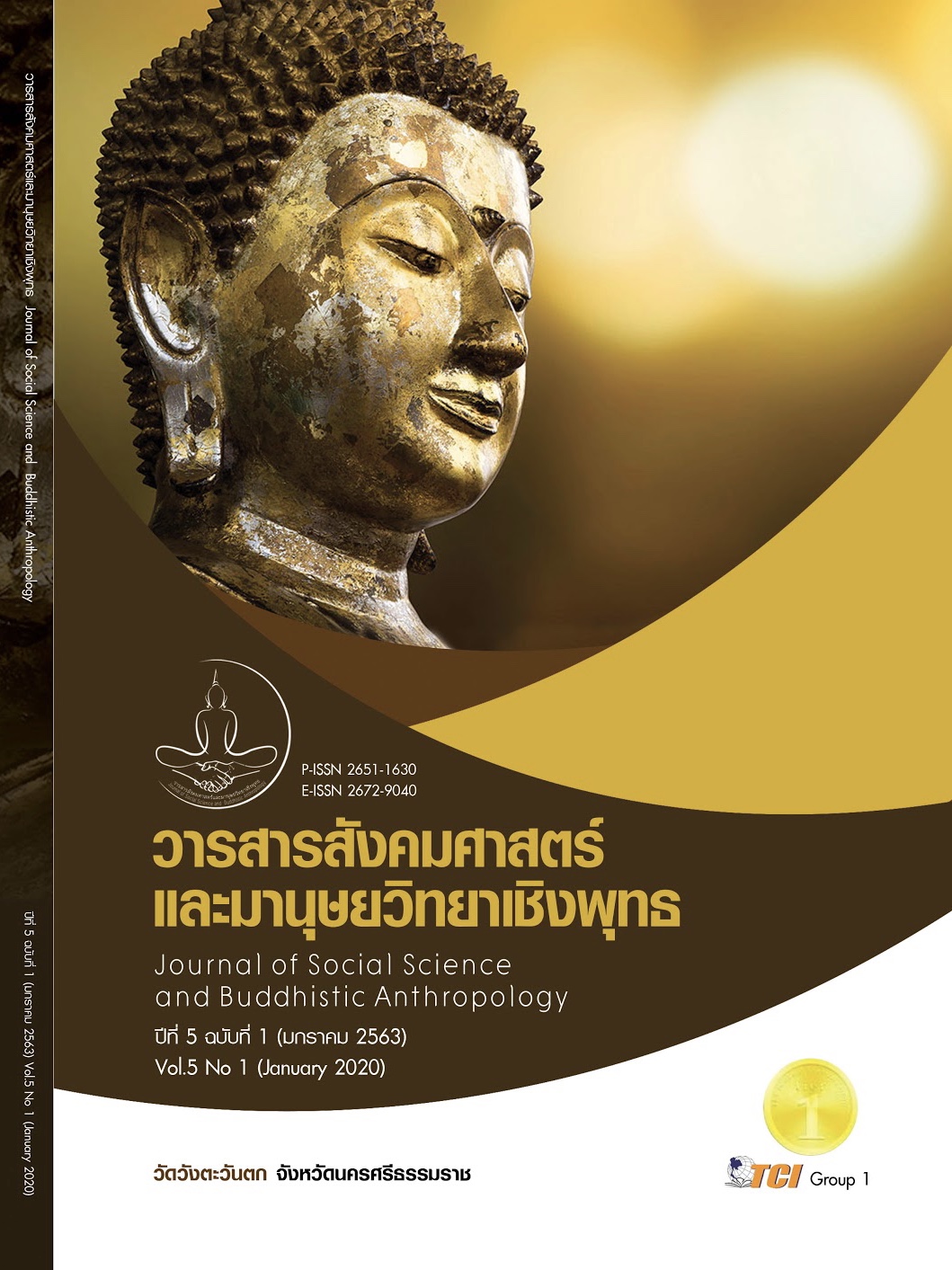AGEING EMPOWERMENT GUIDELINES BY USING THE TEMPLE BASED AGEING SELF - CARE IN THAILAND
Keywords:
Empowerment, Elderly, Temple, Self-CareAbstract
The objectives of this research were to study 1) readiness and social capital of Buddhist temple that facilitates the temple as a base for the elderly self-care, 2) factors affecting the use of the temple as the base for the elderly self - care, and 3) guidelines for empowering the elderly by using the temple for their own self-care. The methodology combined qualitative and quantitative research. A quantitative method was used to collect data from 489 elderly people who participated in the temple activities. Seven temples from 6 regions of the country were selected accidentally. The research tools were questionnaires with a reliability of 0.87. A qualitative method was used to collect data from 26 key informants by mean of in-depth interviews as abbots, older presidents of Province, officers of Social Development and Human Security and officers in local administrative organizations. Research instruments were questionnaires, structured interview, observation form, and focus group. Data were analyzed by using descriptive statistics; percentage, frequency, means, standard deviation and the Stepwise multiple regression analysis. As for qualitative methods, in-depth interview with content analysis is used to present data. The results show that 1) the readiness of the temple as a whole of Thailand is at a medium level while social capital that facilitates the temple as a base for the elderly self-care was high. 2) Cultural capital, resource capital, and human resource were factors affecting different degree of the readiness of the temple with statistical significance. and 3) empowerment of the elderly was at medium level. This research suggests that participatory empowerment should be used for the elderly that making public interest for Buddhist temple.
References
กรมกิจการผู้สูงอายุ. (2562). สถิติผู้สูงอายุของประเทศไทย 77. เรียกใช้เมื่อ 1 ตุลาคม 2562 จาก https://www.dop.go.th/th/know/1/275
กัลยาณี พละทรัพย์. (2553). การเสริมสร้างพลังอำนาจทางสุขภาพของผู้สูงอายุโดยใช้กระบวนการมีส่วนร่วม บ้านกุ่มพะยา ตำบลบึง อำเภอขามทะเลสอ จังหวัดนครราชสีมา. ใน วิทยานิพนธ์มหาบัณฑิตการจัดการสิ่งแวดล้อมและสุขภาพ สาขาสาธารณสุขศาสตร์และเทคโนโลยีสุขภาพ. วิทยาลัยนครราชสีมา.
ชูใจ คูหารัตนไชย. (2538). สถิติเบื้องต้น. กรุงเทพมหานคร: โครงการตำราวิชาการ.
นภเรณู สัญจจรักษ์. (2562). ทฤษฎีเกี่ยวกับการสนทนาในรูปแบบกลุ่ม (Focus Group). เรียกใช้เมื่อ 1 ตุลาคม 2562 จาก https://www.li.mahidol.ac.th/seminar/pdf/VOC-2.pdf
นิศา ชูโต. (2548). การวิจัยเชิงคุณภาพ. กรุงเทพมหานคร: พริ้นต์โพร.
บุษกร เชี่ยวจินดากานต์. (2561). เทคนิคการวิจัยเชิงคุณภาพแบบกรณีศึกษา. วารสารศิลปศาสตร์ปริทัศน์ คณะศิลปศาสตร มหาวิทยาลัยหัวเฉียวเฉลิมพระเกียรติ, 13(25), 103-118.
ประไพพิมพ์ สุธีวสินนนท์ และประสพชัย พสุนนท์. (2559). กลยุทธ์การเลือกตัวอย่างสำหรับการวิจัยเชิงคุณภาพ. วารสารปาริชาต มหาวิทยาลัยทักษิณ, 29(2), 31-48.
ประยูรศรี บุตรแสนคม. (2555). การคัดเลือกตัวแปรพยากรณ์เข้าในสมการถดถอยพหุคูณ. วารสารการวัดผลการศึกษามหาวิทยาลัยมหาสารคาม, 17(1), 43-60.
พระครูปลัดสราวุธ ฐิตปญฺโญ, พระมหากฤษฎา กิตฺติโสภโณ และสุรพล สุยะพรม. (2560). การพัฒนาวัดเพื่อเป็นศูนย์กลางการเรียนรู้ของชุมชนในจังหวัดชลบุรี. วารสาร มจร สังคมศาสตร์ปริทรรศน์, 6(2), 505-522.
พระมหาโยธิน โยธิโก. (2560). บทบาทพระสงฆ์ไทยในการส่งเสริมสุขภาพผู้สูงอายุในภาคตะวันออกเฉียงเหนือ. วารสารวิชาการธรรมทรรศน์, 17(3), 25-36.
พระวัฒธยา ฐิติสมฺปนฺโน. (2560). ความร่วมมือของบ้าน วัด โรงเรียนในการพัฒนาสังคม อำเภอวิหารแดง จังหวัดสระบุรี. วารสาร มจร การพัฒนาสังคม, 2(3), 86-102.
ศิริพร สันถวชาติ. (2551). การปฏิบัติธรรมกับการอบรมพัฒนาร่างกายและจิตใจของผู้สูงอายุไทย. เรียกใช้เมื่อ 25 พฤษภาคม 2551 จาก https://cuir.car.chula.ac.th/handle/123456789/14278
สิริพร ทาชาติ. (2550). การดูแลผู้สูงอายุวิถีพุทธ: กรณีศึกษาสถานสงเคราะห์ผู้สูงอายุ วัดป่าหนองแซง จังหวัดอุดรธานี. ใน ศิลปศาสตรมหาบัณฑิต สาขาวิชาวัฒนธรรมศาสตร์. มหาวิทยาลัยมหาสารคาม.
สุนทร โสภณอัมพรเสนีย์. (2551). การพัฒนาพฤติกรรมการดูแลสุขภาพตนเองของผู้สูงอายุ โดยกระบวนการสร้างเสริมพลังอำนาจ บ้านหนองพลวง ตำบลหนองพลวง อำเภอจักราช จังหวัดนครราชสีมา. ใน วิทยานิพนธ์สาธารณสุขศาสตรมหาบัณฑิต สาขาสาธารณสุขชุมชน. มหาวิทยาลัยราชภัฏนครราชสีมา.
สุภางค์ จันทวานิช. (2554). การวิเคราะห์ข้อมูลในการวิจัยเชิงคุณภาพ. กรุงเทพมหานคร: โรงพิมพ์แห่งจุฬาลงกรณ์มหาวิทยาลัย.
เสาวภา พรสิริพงษ์, ขวัญจิต ศศิวงศาโรจน์ และยงยุทธ บุราสิทธิ์. (2557). วัดในพุทธศาสนากับความพร้อมในการรองรับสังคมผู้สูงอายุ. วารสารภาษาและวัฒนธรรม มหาวิทยาลัยมหิดล, 33(1), 99-125.
อรรครา ธรรมาธิกุล. (2558). การพัฒนารูปแบบการเสริมสร้างพลังอำนาจผู้สูงอายุเพื่อพัฒนาชุมชน. ใน วิทยานิพนธ์ปรัชญาดุษฎีบัณฑิต สาขาวิชาพัฒนศึกษา. มหาวิทยาลัยศิลปากร.
Best, J., & Kahn, J. V. (1993). Research in Education. Boston: Allyn and Bacon.
Cronbach, Lee J. (1984). Essentials of Psychological Testing. New York: Harper.









